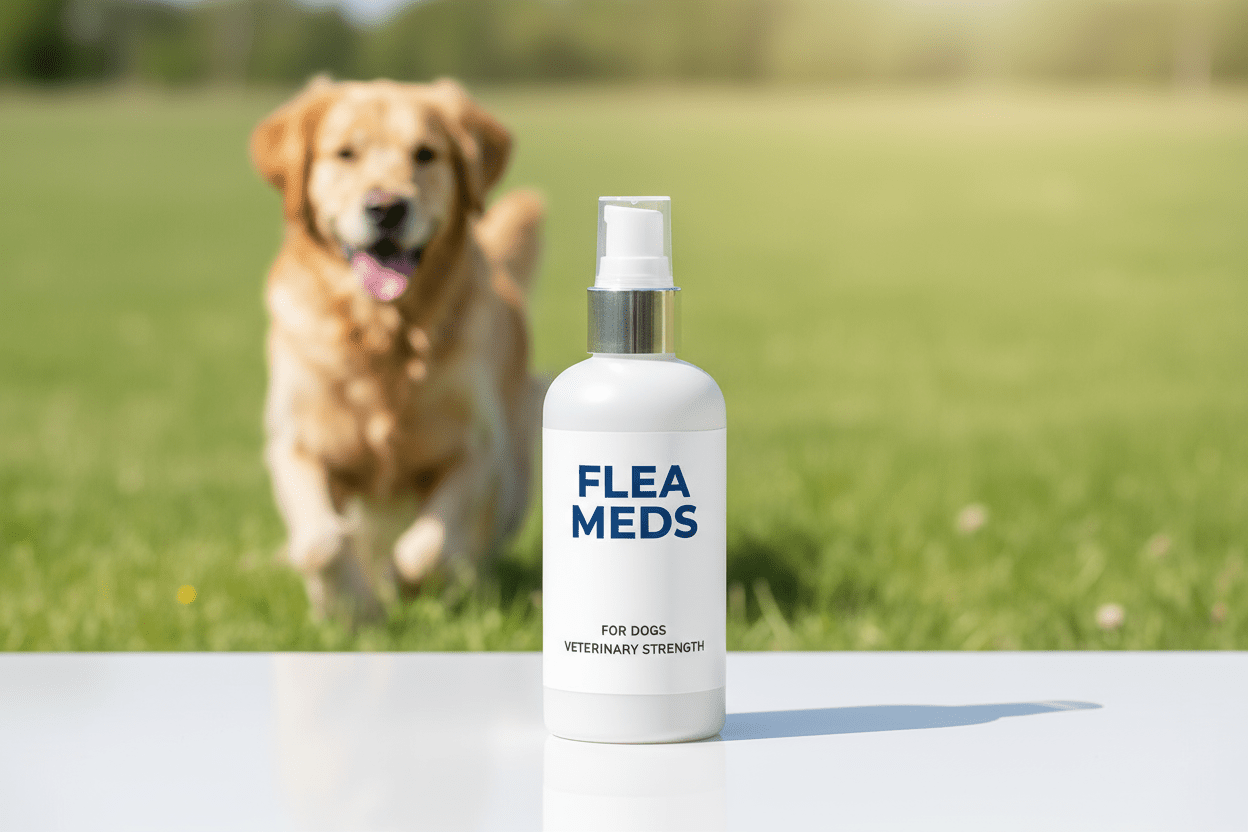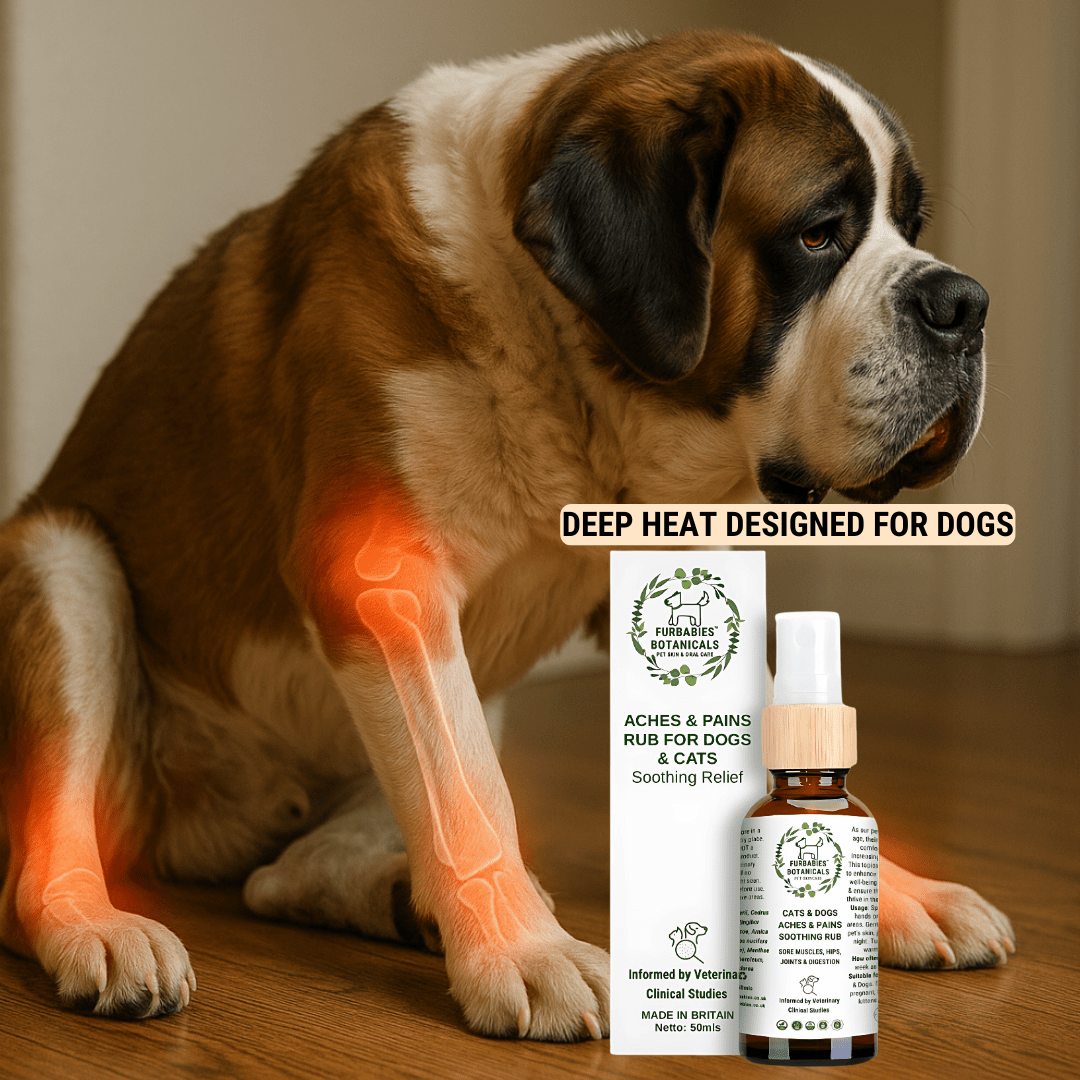Piriton for Dogs: Uses, Safety, and When to Avoid It
When managing your dog’s allergies or itching, Piriton (also known as chlorphenamine) may be suggested as a short-term solution. But is it safe for dogs? How does it work, and when should it be avoided? In this blog, we'll explore everything you need to know about Piriton for dogs, including its uses, safety, risks, and natural alternatives.
What is Piriton, and How Does It Work for Dogs?
Piriton is an antihistamine commonly used in humans to treat allergic reactions like itching, sneezing, and watery eyes. The active ingredient, chlorphenamine, works by blocking histamine receptors, which are responsible for allergic reactions.
For dogs, Piriton is often used in short-term situations, such as:
- Allergic reactions from insect bites
- Hayfever (seasonal allergies)
- Mild food allergies
However, it is important to note that Piriton is not suitable for managing chronic, atopic allergies, such as those caused by atopic dermatitis. These conditions involve complex immune responses that require more targeted, long-term treatments. Piriton only provides temporary relief for acute allergic symptoms and does not address the underlying cause of chronic allergic reactions.
Is Piriton Safe for Dogs?
While Piriton can provide short-term relief from allergic symptoms in dogs, its safety depends on factors such as your dog’s health, breed, and the nature of the allergy. Here's a closer look at the pros and cons of using Piriton for your dog:
Pros:
- Quick relief: Piriton can quickly relieve itching, sneezing, and mild swelling from allergic reactions.
- Short-term use: For acute allergic reactions, it can be effective under veterinary guidance.
Cons:
- Side effects: Drowsiness is the most common side effect. Some dogs may also experience gastrointestinal issues, such as vomiting or diarrhoea.
- Not suitable for chronic conditions: Piriton is not recommended for managing chronic atopic allergies like atopic dermatitis, as it does not treat the root cause of these immune system-driven conditions.
When Should You Avoid Giving Your Dog Piriton?
There are several situations when Piriton should be avoided in dogs:
- Chronic atopic allergies: Conditions like atopic dermatitis require targeted, long-term treatment, as Piriton does not address the underlying immune dysfunction that causes these conditions.
- Pre-existing health conditions: Dogs with liver or kidney disease may have difficulty metabolising Piriton, making it unsafe.
- Drug interactions: If your dog is taking other medications, particularly sedatives or pain relievers, Piriton could interact with them.
In these cases, it’s important to work with your vet to explore alternative treatment options.
Antihistamines like Piriton (chlorphenamine) are generally not effective for canine atopic dermatitis (CAD) because of the pathophysiology of the condition and how antihistamines work.
Why Antihistamines Are Ineffective for Canine Atopic Dermatitis
1. Histamine is not the primary driver
-
- In humans, histamine plays a major role in allergic reactions, so antihistamines are effective.
- In dogs, canine atopic dermatitis is not primarily mediated by histamine. Instead, it involves a dysfunctional skin barrier, T-helper cell imbalances (Th2-driven inflammation), and cytokines like IL-31, IL-4, and IL-13. These drive the itch and inflammation, not histamine.
2.Dog mast cells release less histamine compared to humans
-
- Studies suggest that dogs' mast cells release less histamine, meaning that antihistamines have a weaker effect on their allergic responses compared to humans.
3. Antihistamines work best preventatively
-
- Antihistamines block H1 receptors and work before histamine is released.
- In chronic CAD, histamine has minimal involvement, and inflammation persists even if histamine is blocked.
Are Any Antihistamines Suitable?
- Limited benefit: Some vets try antihistamines (e.g., cetirizine, hydroxyzine, diphenhydramine), but response rates are low (~10-30%).
- Better for mild cases or adjunct therapy: Antihistamines may help mild cases of allergic skin disease or be used alongside other treatments (e.g., essential fatty acids or Apoquel).
More Effective Alternatives for Canine Atopic Dermatitis
- Oclacitinib (Apoquel) – Blocks JAK-1 cytokines (including IL-31) to rapidly relieve itching.
- Lokivetmab (Cytopoint) – A monoclonal antibody that neutralises IL-31, stopping itch signals.
- Corticosteroids (short-term use) – Suppress inflammation but have side effects with long-term use.
- Allergen-specific immunotherapy (ASIT) – Custom-made allergy shots to desensitise the immune system.
- Barrier repair therapy – Using fatty acid supplements and skin-supportive treatments to improve the skin barrier function.
While antihistamines like Piriton (chlorphenamine) are safe for dogs in general, they are largely ineffective for CAD because histamine is not the main cause of itch and inflammation. Instead, targeting IL-31, cytokines, and immune dysregulation through Apoquel, Cytopoint, and immunotherapy is far more effective comparatively - however these do have their pros & cons.
See our blogs on Apoquel and Cytopoint (pros & cons) for more information.
Vet Prescribed Guidelines for Piriton in Dogs
If your vet has recommended Piriton, it’s essential to follow the correct dosage to minimize the risk of side effects. According to the BSAVA guidelines:
- Dosage: The typical dose of Piriton for dogs is 0.2-0.4 mg per kg of body weight every 8-12 hours.
- Frequency: It is usually given 2 to 3 times daily for acute allergic reactions. However, it's important to follow your vet's specific recommendations based on your dog’s individual needs.
BSAVA Reference: The BSAVA (British Small Animal Veterinary Association) recommends antihistamines like Piriton for dogs with mild, short-term allergic reactions. However, it’s essential that the use of antihistamines be monitored and that they are not used as a long-term solution for chronic conditions like atopic dermatitis.
Reference: British Small Animal Veterinary Association. (n.d.). Antihistamines for dogs. Retrieved from https://www.bsava.com
Common Side Effects of Piriton for Dogs
As with any medication, Piriton can have side effects. Some common side effects in dogs include:
- Drowsiness: The most common side effect, as chlorphenamine has sedative properties.
- Vomiting or diarrhoea: Some dogs may experience digestive upset after taking Piriton.
- Dry mouth: Dogs may develop excessive thirst or discomfort due to dry mouth.
If your dog experiences any of these side effects, contact your veterinarian immediately. Prolonged use of Piriton can also lead to more serious complications, such as liver damage in dogs with pre-existing conditions.
Natural Alternatives to Piriton for Dogs
For long-term management of dog allergies, natural alternatives may offer relief without the side effects of antihistamines like Piriton. Here are some options to consider:
1. FurBabies Botanicals DermaProtect Serum
Our DermaProtect Serum is ideal for pets suffering from itching, dry skin, or irritation caused by allergies. With ingredients like Calendula and Clary Sage, it helps restore the skin barrier while soothing discomfort. It’s a safe, natural alternative for managing chronic skin irritation without relying on sedating medications.
2. Omega Fatty Acids (Fish Oil)
Omega-3 fatty acids found in fish oil can help reduce inflammation and improve overall skin health, making it an excellent option for dogs with chronic allergies or skin conditions.
3. Aloe Vera Gel
Aloe vera is another natural remedy that can provide relief from itchy skin. It has cooling and anti-inflammatory properties, making it an effective option for soothing inflamed areas of your dog's skin.
By choosing natural alternatives like these, you can help your dog manage their allergies safely and effectively, without the need for over-the-counter antihistamines like Piriton.
FAQ summary about Piriton for Dogs
1. Can I give my dog Piriton daily?
While Piriton (Chlorphenamine) can be used for short-term relief of mild allergic reactions in dogs, it is not recommended for daily use, especially for chronic conditions like atopic dermatitis. Chronic use could lead to unwanted side effects, such as sedation and gastrointestinal issues. Always consult your vet for long-term allergy management options, as there are more appropriate treatments for chronic allergies.
2. Is Piriton safe for dogs?
When used according to your vet’s recommendations, Piriton can be safe for treating mild allergies or itching in dogs. However, it is important to avoid using it for chronic conditions like atopic dermatitis, where long-term management and specific treatments are needed. Always check with your vet before administering Piriton to ensure the proper dosage and appropriateness for your dog’s needs.
3. What are the side effects of Piriton for dogs?
Common side effects of Piriton in dogs may include drowsiness, dry mouth, and urinary retention. In rare cases, some dogs may experience more serious reactions like lethargy, digestive issues, or altered behavior. Always monitor your pet closely after giving Piriton, and consult your vet if any adverse effects occur.
4. What is the correct Piriton dosage for dogs?
Dosage for Piriton in dogs typically depends on their weight and the severity of the allergic reaction. The general guideline is 0.5 mg to 1 mg per kilogram of body weight, given up to two or three times per day. However, it is crucial to follow your vet’s specific recommendations. Never exceed the prescribed dose.
5. What are alternatives to Piriton for managing dog allergies?
For chronic allergic conditions like atopic dermatitis, Piriton is not recommended. Your vet may suggest antihistamines specifically suited for long-term management, such as those that target the inflammatory processes associated with atopic dermatitis. Natural remedies like soothing pet skincare products, dietary adjustments, or targeted supplements may also offer additional support for pets with allergies.
Comparison of Piriton with Other Allergy Treatments
| Medication | Uses | Suitability for Chronic Allergies | Side Effects | Dosage |
|---|---|---|---|---|
| Piriton (Chlorphenamine) | For short-term relief of mild allergic reactions such as itching, hives, or mild insect bites. | Not suitable for chronic allergies like atopic dermatitis. Limited to occasional use. | Drowsiness, dry mouth, urinary retention, and potential gastrointestinal upset. | 0.2–0.4mg per kg of body weight, 2-3 times a day (consult vet). |
| Atopica (Cyclosporine) | Used to treat chronic allergic dermatitis, including atopic dermatitis. | Suitable for long-term use in managing chronic allergies like atopic dermatitis. | Gastrointestinal issues, lethargy, potential kidney and liver concerns. | As prescribed by your vet based on your dog’s weight and condition. |
| Apoquel (Oclacitinib) | For the treatment of allergic itching in dogs, including atopic dermatitis. | Specifically formulated for chronic allergic conditions and long-term management of atopic dermatitis. | Vomiting, diarrhea, lethargy, and potentially immune system suppression. | As prescribed by your vet based on weight and clinical response. |
Conclusion
Piriton (Chlorphenamine) can be an effective option for short-term relief of mild allergic reactions in dogs, such as itching from insect bites or seasonal allergies. However, it is not suitable for chronic conditions like atopic dermatitis, where more specific and long-term management options are necessary. Alternatives like Atopica or Apoquel are designed for ongoing allergy treatment and are more appropriate for managing chronic allergic conditions.
Always consult your vet or vet pharmacist (you can message us) before administering any medication to your dog to ensure the correct treatment and dosage. Your vet can guide you in choosing the best course of action based on your dog’s specific condition and needs. Remember, while Piriton can provide quick relief for some dogs, it should not be the first line of treatment for long-term allergy management.
British Small Animal Veterinary Association. (n.d.). BSAVA Drug Formulary. Retrieved from https://www.bsava.com (Accessed 06/02/2025)














Share:
My Fur Babies, Furbabies, FurBaby, Fur Babies – Finding the Right Pet Skincare Brand
Herbal Flea Treatment for Dogs & Cats: Evidence-Based Guide